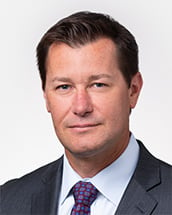In brief
On 1 December 2023, the US Court of Appeals for the Fourth Circuit reversed a Sherman Act conviction of a former executive of an aluminum products manufacturer for failure to state a per se antitrust offense.1 While DOJ is considering en banc review of this opinion, if upheld the decision could have lasting implications for how the DOJ proceeds with indictments involving parties that engage in dual distribution. We will continue to monitor for future developments in this case as it moves forward.
To listen to a podcast on these issues, click here.
Key takeaways
In February 2022, the former executive was found guilty of six counts: conspiracy to rig bids, conspiracy to commit mail or wire fraud, three counts of mail fraud, and one count of wire fraud. The court affirmed the mail and wire fraud convictions, but reversed the Sherman Act conviction of conspiracy to rig bids. The Fourth Circuit held that the trial court erred in applying the per se rule without considering the fact that the alleged scheme took place within the context of a “dual distribution” relationship among competing bidders, who also maintained an exclusive supplier relationship. As a result, the court held that defendants’ academic analysis regarding competitive effects should have been considered, and the economic evidence defendants presented demonstrated the alleged agreement did not invariably lead to anticompetitive effects (like higher prices). The key takeaways are:
- This opinion was issued by a three-judge panel in the Fourth Circuit. DOJ is considering whether to petition for a rehearing en banc.
- If this precedent is maintained, it could complicate criminal prosecutions involving agreements among competitors that have a “dual distribution” relationship (i.e., competitors that contract with each other to distribute or source products or services). In this case, the Fourth Circuit concluded that the per se rule did not apply to the alleged bid-rigging agreement because the arrangement also related to the parties’ vertical supply relationship.
- It is an open question whether other courts will follow the Fourth Circuit’s decision. In bid-rigging cases, economic analysis is usually not considered by the court because it is a per se crime. However, the Fourth Circuit’s approach requires the trial court to more fully consider the overall economic relationships among the parties. This approach, if upheld, could lead to more narrow applications of the per se rule and, potentially, divergences between courts in whether they require economic analysis in a bid-rigging case.
- According to the Fourth Circuit, the trial court erred when it categorically ignored academic analysis of the economic effects associated with the restraint DOJ alleged in the indictment. This opinion, if upheld, could support future defendants’ arguments that trial courts should first consider the parties’ relationships, commercial realities, and economic evidence demonstrating a lack of anticompetitive effects before concluding the per se rule ought to be applied. This approach could also be cited to support more narrow applications of the per se rule in contexts that involve similar vertical relationships between co-conspirators.
- The Fourth Circuit highlighted (in dicta) that the DOJ was vulnerable to defendant’s pre-trial motion to dismiss the antitrust count by including detailed allegations in the indictment that referenced the vertical relationship between the purported co-conspirators. Given the court’s explanation that such detail was not required, the DOJ may balance the benefits of presenting detailed allegations in indictments (which in some cases can help DOJ argue for broader admissibility of evidence and tell a cohesive story when proving its case-in-chief) against mitigating the risk that allegations about vertical relationships could draw pushback from defendants on whether the per se rule applies.
In more detail
In October 2020, a grand jury returned an indictment charging aluminum manufacturer (“Contech”) and its former sales executive with one count of conspiring to restrain trade in violation of the Sherman Act, and five counts of mail and wire fraud.
The indictment alleged that defendants conspired to rig bids with another aluminum manufacturer (“Pomona Pipe”) in connection with North Carolina Department of Transit (NCDOT) contracts. DOJ alleged that the two aluminum manufacturers frequently submitted bids for the same NCDOT contracts. If Contech was the winning bidder, then it would use Pomona Pipe to provide services required under the contract. Alternatively, if Pomona Pipe was the winning bidder, then it would source aluminum required for the contract from Contech. However, DOJ alleged that the situation changed in 2009 when the executive was appointed to oversee NCDOT contracts for Contech. At this time, the executive began to coordinate bids to ensure that Pomona Pipe always submitted a lower bid than Contech.
Before trial, defendants filed a joint motion arguing that the court should not apply the per se rule, which deems a certain limited categories of “horizontal” agreements between competitors (i.e., price-fixing, bid rigging, and market allocations) to be unlawful restraints of trade without any consideration as to the actual competitive effects or business justifications associated with the arrangement.2 The trial court denied defendants’ motion, and the case went to trial resulting in the executive’s conviction on all counts.
The executive appealed his convictions on several grounds, including on the ground that the trial court erred in denying his pretrial motion to dismiss the antitrust count for failing to state a per se antitrust violation. On appeal, the Fourth Circuit found that the per se rule did not apply to agreements between the alleged co-conspirators in this case — which maintained an active supply relationship in fulfilling successfully bid upon contracts. Against the backdrop of the parties’ “dual distribution” relationship, the court determined that the bidding scheme operated as a “hybrid” restraint with both horizontal and vertical components. The court also noted that in cases alleging per se violations where parties maintain a vertical relationship, a presumption in favor of the rule of reason should be applied, which may be overcome only with “demonstrable economic effect” showing that the agreement would invariably harm competition.3
Based on this holding, the Court determined that the trial court erred in denying defendant’s motion to dismiss the antitrust count without first considering the academic expert analysis addressing the economic effects of the alleged restraint. The Fourth Circuit then went on to explain that economic evidence presented by the defendants demonstrated that the alleged scheme would not have invariably anticompetitive effects. To the contrary, the Court concluded that even if the competition between the manufacturer and supplier was eliminated by defendant manufacturer submitting intentionally losing bids in favor of the distributor Pomona, the alleged scheme gave rise to potential procompetitive effects on inter-brand competition among the remaining bidding aluminum manufacturers. Accordingly, the Court found that these potential procompetitive effects showed that the alleged restraint on trade did not invariably result in anticompetitive harm, and the per se rule should not have been applied.
1 United States v. Brewbaker, No. 22-4544, (4th Cir., 1 Dec 2023).
2 The DOJ in its prosecutorial discretion has reserved criminal antitrust enforcement for challenging agreements that are subject to the per se rule.
3 Under the rule of reason, a court looks at the parties’ market power, the overall competitive effects associated with the restraint, and any procompetitive business justifications offered by defendants in determining whether an agreement unlawfully “restrains” trade.







